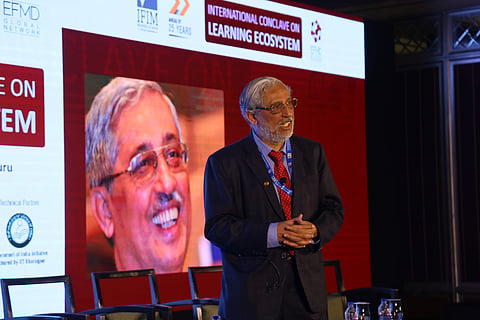

All the debate, praise and criticism that the New National Education Policy (NEP) has earned over the past year aside, its implementation after the lockdown will prove just what a game changer it is, said AICTE Chairman Anil Sahasrabudhe. When asked about the big changes that were expected from the MHRD post the COVID-19 situation, he said, "The New Education Policy is around the corner. There are many announcements in line which people might think are because of the COVID-19 situation, but it is not so. NEP is going to fill the void created by COVID-19. People will know very soon how effective this New Education Policy is going to be."
He was in conversation with S Vaidhyasubramaniam, Vice-Chancellor, SASTRA Deemed-to-be University and Kaveree Bamzai, Senior Journalist and Author on The New Indian Express' webcast series Expressions.
He also said that the NEP would solve plenty of problems that the pandemic and lockdown have caused. "This will help us fight all sorts of problems in the education field which are going to occur in the future. The HRD Minister has already announced its the arrival and it has been sent to the cabinet for review. With the sudden COVID-19 crisis, the central and state governments have been busy firefighting the situation, otherwise it would have been announced by now."
Responding to a question about the burgeoning importance of online education and testing in a post-COVID world from Dr Vaidhyasubramaniam, he said that there was every likelihood that adoption of digital practices would impact the next NIRF ranking. He said, "In our NIRF footprint, whatever parameters were decided four years ago were based on certain presumptions. While we say that the curriculum has to be revised continuously, the ranking system also has to be changed according to the requirements and society's aspirations. I am sure there will be parameters which will come in and have a greater significance based on the digital platform and usage."
One thing that is likely to feature in the NIRF framework, though, is how ecologically sound and green your institution is. He added, "The most important priority will be given to UN Sustainable Goals to see how green our college campuses are in terms of using minimal resources, waste management, the energy produced. These factors need to be prioritised so that we drive home these practices and apply them wherever we go."
Sahasrabudhe also spoke about the impact of COVID-19 on the education sector and emphasised on India making the most of this situation. "Since many universities abroad are not opening up due to COVID-19 and are going for online classes, many bright students would not like to lose a year. This pandemic is such there is no certainty of the opening of institutions abroad. There are chances that bright students might take admission in the IITs, IIMs, IISc and many good private universities. I think many students will get into our Indian systems rather than going abroad for higher studies and saving in terms of dollar exchange. Our chances have brightened up. But some people will take the risk and wait for six more months to go abroad."
The professor, who has worked in some of the country's top institutes, then spoke about how, in order to take technical education to a larger audience, AICTE has begun the process of translating the courses on the Swayam portal into eight Indian languages. "We all are dealing with the various educational courses in the English language. If you look at the entire Swayam portal, all the courses are available are in English. Therefore, AICTE has taken up a task of translating these two and half thousand courses in eight major languages in India which will bring a big change," he said. "The reason behind taking up this task is many students in the formative years or when they join the college are not confident in studying in English as they would have studied in their own language like Tamil, Marathi, Bengali or Kannada. Therefore, they might feel diffident at that point in time to catch up with what is taught. If the foundational or initial courses are available in multiple Indian languages, they will pick up faster," he added.
